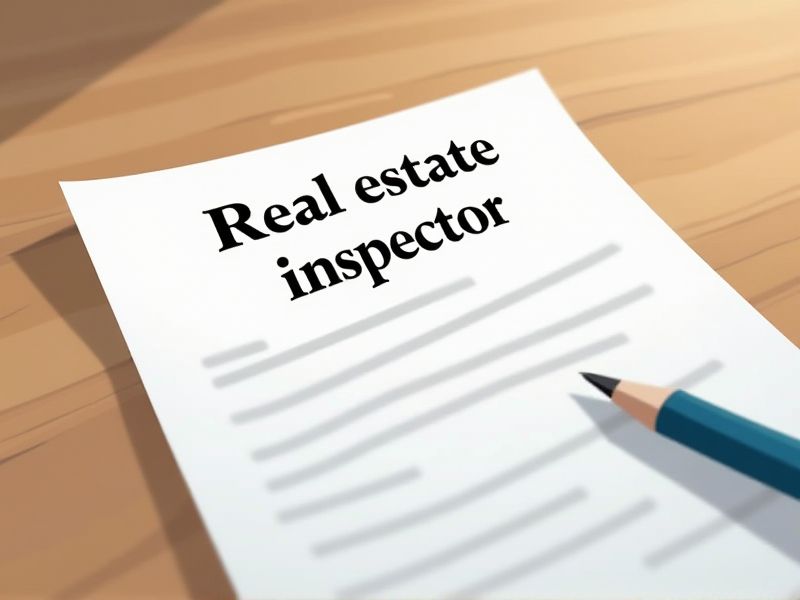
Real estate inspectors play a critical role in assessing the condition and value of properties, requiring specialized knowledge and expertise. Certifications help ensure inspectors possess the necessary skills to identify structural issues, safety concerns, and compliance with regulations. These credentials also enhance credibility and trustworthiness, reassuring clients of the inspector's professionalism. Here are some important certifications essential for a real estate inspector.
ASHI Certified Inspector
Obtaining ASHI Certification ensures that real estate inspectors adhere to rigorous industry standards, enhancing their credibility. This certification indicates that inspectors possess the necessary knowledge and skills, leading to enhanced accuracy in inspections. Buyers and sellers gain confidence in transaction processes when they know inspections are performed by certified professionals. Over time, this contributes to smoother real estate transactions and successful home sales.
InterNACHI Certified Professional Inspector
InterNACHI Certified Professional Inspectors adhere to a stringent code of ethics, ensuring that real estate inspections maintain high standards of professionalism and integrity. Their training encompasses a comprehensive curriculum, equipping them with deep knowledge to identify various issues in properties, which enhances buyer confidence. Continuous education requirements for certification mean these inspectors stay updated on the latest practices and technologies, providing more accurate assessments. This certification can ultimately protect clients from unforeseen liabilities by ensuring thorough property evaluations.
NAHI Certified Inspector
A NAHI Certified Inspector is necessary because they possess a verified understanding of home inspection standards, ensuring the accuracy of property assessments. Their certification signifies comprehensive training in identifying potential issues, reducing the risk of overlooking problems that could lead to costly repairs. Buyers and sellers gain confidence in the transaction process due to their reliable evaluations. Real estate agents benefit as a NAHI Certified Inspector provides detailed reports, facilitating smoother negotiations and informed decision-making.
International Code Council (ICC) Inspector Certification
The ICC Inspector Certification provides real estate inspectors with a standardized benchmark of knowledge, ensuring they understand and comply with current codes and regulations. Real estate transactions often involve significant investments; having a certified inspector helps instill trust and confidence in the inspection process. Certified inspectors are typically more proficient in identifying potential building safety and compliance issues, which can protect buyers and sellers from legal liabilities. Market demand for certified professionals often translates into higher earning potential and better job opportunities for inspectors holding ICC certification.
EPA Lead-Safe Certified Renovator
The presence of lead in older buildings can pose significant health risks, especially to children, necessitating strict inspection protocols. An EPA Lead-Safe Certified Renovator is crucial for real estate inspectors to effectively identify and manage lead hazards during renovations. Certification ensures that the inspector is equipped with the necessary knowledge and skills to prevent lead contamination. This ultimately enhances property safety, protecting both current residents and potential buyers from lead exposure.
Mold Assessment Certification
Mold assessment certification equips real estate inspectors with the expertise to accurately identify and evaluate mold-related issues in properties. Certified inspectors tend to make more informed decisions, reducing potential health risks for occupants. Real estate transactions can be influenced by mold conditions; a certified inspector offers reassurance to buyers and sellers. Certification aligns inspectors with industry standards, often required legally or by insurance companies.
Radon Measurement Specialist Certification
Radon is a radioactive gas that can accumulate in buildings and poses significant health risks, hence real estate inspectors need to be certified to accurately measure its levels. This certification ensures inspectors have the technical know-how to identify potential radon hazards, which is critical for informing buyers and sellers of potential risks. Accurate radon assessments impact property values and occupancy safety, making certified inspectors essential for sound real estate transactions. Having this certification meets regulatory standards and builds trust with clients, ensuring the safety and compliance of property transactions.
Home Energy Rating System (HERS) Certification
A HERS certification allows real estate inspectors to provide an energy efficiency rating for homes, which directly impacts property value assessments. Buyers increasingly prioritize energy-efficient homes, and inspectors with HERS certification can offer more accurate and pertinent evaluations. Legislation often requires energy performance documentation, and a HERS-certified inspector ensures compliance. The demand for sustainable buildings has risen, making HERS certification a valuable tool for inspectors to differentiate their services.
Thermal Imaging Certification
Thermal imaging certification enhances a real estate inspector's ability to accurately detect issues like water intrusion or inadequate insulation. Inadequate inspection could lead to undiscovered energy inefficiencies, causing increased costs for property owners. Certified thermal imaging ensures compliance with industry standards, reducing liability risks. Real estate inspections with certified thermal imaging capabilities often result in higher client trust and potentially more business opportunities.
Building Performance Institute (BPI) Certification
The Building Performance Institute (BPI) Certification equips real estate inspectors with validated skills in energy efficiency, improving their capacity to identify issues that affect property energy performance. Homebuyers increasingly seek energy-efficient homes, so certified inspectors can provide insights that align with consumer demands, enhancing client trust. Energy efficiency standards constantly evolve, and BPI certification ensures inspectors stay updated with current practices. Enhanced credibility gained through BPI certification often results in increased job opportunities and professional growth for real estate inspectors.
Summary
Gaining certifications as a real estate inspector can enhance your credibility in the industry. Certifications often lead to more job opportunities and potentially higher income. You may find that advanced training through these certifications increases your skill set and efficiency in inspections. Clients are more likely to trust and hire you, knowing that you adhere to industry standards and best practices.
